#Hall of John the Baptist
Explore tagged Tumblr posts
Text

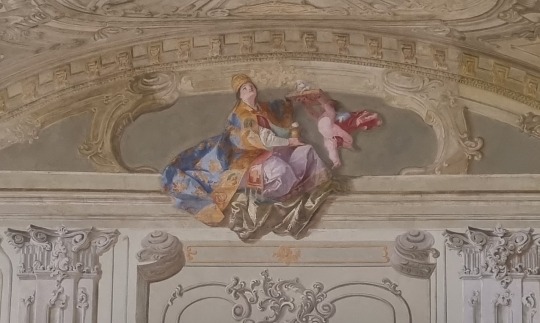
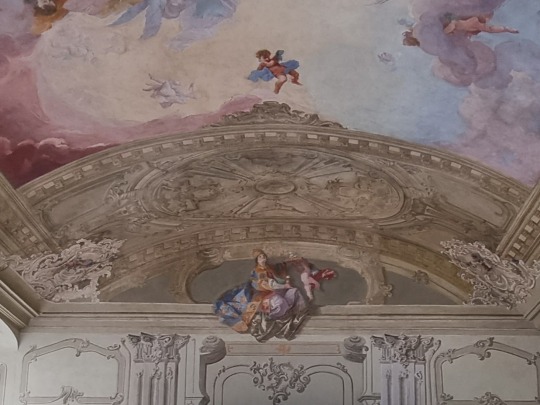
Detail of the ceiling fresco in the Hall of John the Baptist at the main building of the Austrian Academy of Sciences The Hall of John the Baptist was decorated around 1766/1767 with a ceiling fresco by Franz Anton Maulbertsch showing the baptism of Christ. Detail des Deckenfreskos im Johannessaal des Hauptgebäudes der Österreichischen Akademie der Wissenschaften Der Johannessaal wurde um 1766/1767 mit einem Deckenfresko von Franz Anton Maulbertsch ausgestattet, das die Taufe Christi zeigt. Деталь потолочной фрески в зале Иоанна Крестителя (Йоханнес-зал) в главном здании Австрийской академии наук. Зал Иоанна Крестителя был украшен около 1766/1767 года потолочной фреской работы Франца Антона Маульберча, изображающей крещение Христа. Détail de la fresque du plafond de la salle Jean-Baptiste dans le bâtiment principal de l'Académie autrichienne des sciences La salle de Jean-Baptiste a été décorée vers 1766/1767 avec une fresque de plafond de Franz Anton Maulbertsch représentant le baptême du Christ. Austrian Academy of Sciences, Dr. Ignaz Seipel-Platz 2, 1010 Vienna, Austria
#Österreichische Akademie der Wissenschaften#ÖAW#Austrian Academy of Sciences#Johannessaal#Fresko#fresco#baptism of Christ#Franz Anton Maulbertsch#Franz Anton Maulpertsch#Франц Антон Маульберч#Hall of John the Baptist#1766/1767#Taufe Christi#фреска#Зал Иоанна Крестителя#Йоханнес-зал#Австрийская академиия наук#крещение Христа#fresque#salle Jean-Baptiste#Académie autrichienne des sciences#baptême du Christ#Vienna#Wien#Вена#Австрия#Österreich#Austria#Vienne#Autriche
1 note
·
View note
Text

BEATLES With Girls in 1961 at the Brockman Hall Tuebrook Liverpool Twitter Reblogged
The Beatles in 1961 at the Brockman Hall, St John the Baptist, Tuebrook, Liverpool UK
from Left to Right Pete Best George Harrison John Lennon Paul McCartney
Wikipedia Pete Best ( Drammer Before Ringo Starr Joined ) https://en.wikipedia.org/wiki/Pete_Best
TAG of BEATLES in my Tumblr https://kichisaburo3.tumblr.com/tagged/BEATLES
- - - - - - - - - -
Omg low quality teddy boy Beatles!!! pic.twitter.com/J4UYkjnjRa
— Paris 🌈⃤ || is On The Edge (@cillbreech) June 13, 2020
- - - - - - - - - -
Mono Photo Reblogged :

- - - - - - - - - -
22 NOV 2024 Friday
#Beatles#1961#Pete Best#The Brockman Hall Tuebrook Liverpool UK#St John the Baptist#Tuebrook Liverpool UK#The Beatles#1960s#reblogged#twitter
11 notes
·
View notes
Text

















Savannah fell to the forces of General Sherman on December 22, 1864.
#Cathedral of St. John Baptist#Savannah#General Sherman#22 December 1864#160th anniversary#US history#original photography#summer 2016#Georgia#USA#vacation#travel#tourist attraction#architecture#cityscape#landmark#2013#Savannah River#Forsyth Park#City Hall#Colonial Park Cemetery#Granite Hall#Chippewa Square#historic Savannah Cotton Exchange#flora#tree
2 notes
·
View notes
Photo

I have fought a good fight, I have finished my course, I have kept the faith: Henceforth there is laid up for me a crown of righteousness, which the Lord, the righteous judge, shall give me at that day: and not to me only, but unto all them also that love His appearing. (2 Timothy 4:7–8)
John Lee Tipton of Greenville, SC, met his Savior, the Lord Jesus Christ, on March 18, 2022. He was born in Coatesville, PA, on June 10, 1944, to Isaac Walter Tipton and Betty Hadfield Tipton. He leaves two brothers, Ronald Walter Tipton of Milton, DE, and Isaac Walter Tipton, Jr. of Downingtown, PA. He was married for 58 years to Barbara Princo Tipton, and they had three children, Nancy Lee Tipton of the home, Victoria Lynn (Mark) Payne of Gillette, WY, and John Lee Tipton, Jr. (deceased). John also had two foster daughters whom he loved dearly, Jan Loftis Sinde of Greenville, SC, and Cathy Bridges Powell of San Antonio, TX. He is survived by seven grandchildren and three foster grandchildren.
He served his country in the US Army 529th Military Police in Heidelberg, Germany, and Washington, DC.
He earned a master of arts degree in Bible in 1982 from Bob Jones University and joyfully served the Lord as an assistant pastor at Mount Calvary Baptist Church, Cedar Lane Road, Greenville, SC, since 1983.
Visitation and viewing are at Mount Calvary Baptist Church (115 Cedar Lane Road) on Monday, March 21, 4:45–6:45 p.m.; with the funeral service to follow at 7 p.m. Private interment at Coleman Cemetery in Travelers Rest, SC, will be held Tuesday, March 22. In lieu of flowers, donations may be sent to the Men's Ministries at Mount Calvary Baptist Church, 1430 Hampton Ave. Ext., Greenville, SC 29601.
Published by Cremation Society of South Carolina - Westville Funerals - Greenville on Mar. 18, 2022.
#Bob Jones University#Archive#Obituary#BJU Hall of Fame#BJU Alumni Association#2022#John Lee Tipton#Grad Class of 1982#Mount Calvary Baptist Church#GRACE Report
0 notes
Note
While you were writing NG, have you ever added, sort of, connoted any religious references into it?
Because V's behaviour towards Harry in it is not only so highly canonical to his character, but also so reminiscent of this one story. In the New Testament, Matthew 14:6-12, if I remember right, there was this story about how King Herod hosted a feast on his birthday for his nobles, etc. and the daughter of Herodias came in and danced, pleasing Herod and those who sat with him after which he said to her:
"Ask me for half of my empire, and I will give it to you." So she went out and said to her mother: "What shall I ask?" She said: "The head of John the Baptist!" Immediately she came in with haste to the king and asked: "I want you to give me at once the head of John the Baptist on a platter."
The thing is, also as a religious allusion, that "for what will it profit a man if he gains the whole world, yet forfeits his soul?" which basically translates to human life equals a whole empire. V's never really cared about taking any life. In the Deathly Hallows, the Second Wizarding War overall, the only thing he truly cares about is killing Harry, because Harry's his only mistake, only failure, that he's ever made in his whole life (account hollowed-theory-hall explains it impeccably in one of their posts), and he proves that point. He practically stops caring about everything else, including winning the war and including his supposed empire, but is entirely obsessed with, well, Harry's head — even long before he, in NG, becomes... Infatuated?
And just like Herod, he's so down (for Harry's soul's purity and Harry's own beauty he keeps pointing out and simping over cough cough) that he does things he never thought he'd do and truly considers Harry's head his new empire (sort of like when he goes so far as to haunt down Nicolas Flamel for the elixir of life and all to make Harry immortal, even though... Yeah, it's bc of his OWN immortality's sake but still </3).
Either way, he's beyond repair in terms of head-over-heels IMO and I'm all here for it <33
purposely, no, I haven’t been making any biblical references like that in NG. But the Bible is quite the big book with many stories, and I was raised Catholic, so it’s not surprising to me that there may be a plethora of religious themes there… but none of them are conscience. Hauntingly is an entirely different story and situation of course - very purposeful there.
(and yes you’re right, he’s down bad bad and what’s worse is he’s starting to realize it)
28 notes
·
View notes
Text

The "other" Hampton: Carl Hampton of Houston, Texas, 1948-1970
Co-founder and chairman of the People's Party II, an offshoot of the Black Panther Party.
Carl Hampton was active with the Black Panthers in Oakland. In Houston, he and others set up the People's Party II. Hampton and the Party regularly distributed food and clothes as well as published and distributed their own newspaper. They were passionate anti-racists and Communists who spoke out against the racial profiling and lynchings carried out by the Houston Police
Hampton was assassinated by HPD CID snipers from the roof of a church, using illegal dum-dum (expanding) bullets.
"Hall of Fame broadcaster and former Forward Times reporter Ralph Cooper remembers the strength and impact that Carl Hampton had, as well as how things went down on then-Dowling Street that fateful night. “It was no surprise Carl was killed,” said Cooper. “He stood up and voiced his opinion about HPD in the 1970s, especially about their history of brutalizing Black men. The Peoples Party II had the support of several other groups at the time, who were armed also. A White man by the name of Barter Haile, of the John Brown Revolutionary Party, was also wounded, but survived. Many people in the area were arrested that night. Not only was HPD involved, but many other area law officials were on standby in Houston. This was the first time that many of us had seen the white HPD Tank. It was something to behold.” Cooper states that the details surrounding Hampton’s assassination became even more crystal clear to him, when he went to St. John Missionary Baptist Church on assignment for the Forward Times that next morning. “The next morning, several Black leaders met at St. John Church, because they had heard HPD snipers shot from the roof of the church,” said Cooper. “It was verified when empty shells and unused shells – the military type – were found on the roof of the church. I know, because I went on the roof where I discovered the used and unspent shells, and put them in a bag and gave them to the Black men who were at the church that day"
https://www.forwardtimes.com/archives/featured/the-assassination-of-carl-hampton-remembering-another-victim-of-police-brutality-50-years-later/article_41f35d07-3a82-5901-94d0-0e96531f1447.html

https://www.workers.org/2008/us/hampton_0807/

53 notes
·
View notes
Text

my personal opinion. me PERSONALLY. i agree with peter as jesus (peace, david, i know. stephen stills is john the baptist. the one who is more powerful than i is coming after me...) but i think the other three are better suited to other roles.
davy for example. king herod's song is a jangly vaudeville dance hall number (with a sinister undertone) and it's the only one like that in a show full of soft contemplative tunes and 60s rock and roll songs. you know, like daddy's song. i feel it's almost uniquely made for him and he for it. a cane and beautiful backup dancers and he's ready to go. he could bring a fresh "despotic boy-king" take to josh mostel's excellent disco nero.
micky. he has the range to do king herod but the role of judas was just written for him. he's manic. when we meet him he's delivering one of the show's most shattering vocal performances while going mad in the desert. he's a rock and roll vocalist, with runs and screeches and scatting. he's wild and heavy hitting, and when he finally succumbs to the horror of what he's done, you can hear every thread snap one by one. that matches micky's expressive, explosive style to me. he's the voice of the musical, the one we find ourselves rooting for despite knowing how it ends.
that leaves mike. for all the reasons micky would make an award-winning judas, i think mike wouldn't. as much as the next person, i love to see him as the brooding serpent whose impossible love for peterjesus spells his downfall, but maybe not here. maybe he lines up better with the closely guarded biblical judas, who moves in relative quiet and obscurity, but JCS judas is a loud, bombastic frontman. mary magdalene, on the other hand, is soft, she's water, with a clear mellifluous folk voice. she doesn't know how to love him. were you ever a strong and silent girl before? magdalene was. and she wept for jesus in front of everybody.
rafelson is pontius pilate.
#of course this is just for fun!#id love to hear what anyone thinks op included thank you for having this idea#the monkees#jesus christ superstar
16 notes
·
View notes
Text
britcom comedians & panel show personalities who share your sign
AQUARIUS ♒ dara ó briain • frank skinner • glenn moore • guz khan • hugh dennis • lucy porter • maisie adam • mark watson • phil wang • vic reeves
PISCES ♓ aisling bea • alan davies • dave gorman • ed gamble • jenny eclair • katy wix • michael mcintyre • rose matafeo
ARIES ♈ andy parsons • desiree burch • ed byrne • gary delaney • jamali maddix • john kearns • josh widdicombe • josie long • roisin conaty • romesh ranganathan • rory bremner
TAURUS ♉ al murray • alex brooker • catherine tate • greg davies • joe wilkinson • john robins • mae martin • milton jones • morgana robinson • rhys james • rob brydon • sally phillips • sandi toksvig • sean lock • stephen mangan
GEMINI ♊ alan carr • bob mortimer • david baddiel • fern brady • judi love • julian clary • london hughes • mel giedroyc • noel fielding • paul sinha • rich hall • richard ayoade • sara pascoe • sarah millican • shappi khorsandi • sindhu vee • tom allen
CANCER ♋ adam hills • alice levine • david mitchell • katherine ryan • harriet kemsley • ian hislop • jack whitehall • joe lycett • paul merton • peter serafinowicz • phill jupitus • rosie jones
LEO ♌ bridget christie • cariad lloyd • chris ramsey • daisy may cooper • frankie boyle • isy suttie • lee mack • jo brand • nish kumar • victoria coren mitchell
VIRGO ♍ alex horne • dane baptiste • darren harriott • ivo graham • jimmy carr • johnny vegas • lolly adefope • miles jupp • nina conti • stephen fry • sue perkins • tim key
LIBRA ♎ diane morgan • harry hill • jack dee • jon richardson • limmy • nick helm • rhod gilbert • robert webb • tiff stevenson • zoe lyons
SCORPIO ♏ angela barnes • chris addison • elis james • ellie taylor • holly walsh • liza tarbuck • jonathan ross • kerry godliman • kevin bridges • matt forde • mike wozniak • sofie hagen • susan calman
SAGITTARIUS ♐ adam riches • david o'doherty • jessica knappett • larry dean • miranda hart • richard osman • seann walsh • simon amstell • steven k. amos
CAPRICORN ♑ ahir shah • angus deayton • bill bailey • claudia winkleman • james acaster • mark lamarr • paul foot • rob beckett • suzi ruffell
#REPOSTING CUZ I ACCIDENTALLY DELETED IT HAHA#sorry i can't include every person ever but i tried to at least do everyone's faves!#a good day to be a gemini!!!#signs
130 notes
·
View notes
Text
The churches of the town of Dunwich slowly falling into the sea one after another, as described in a topographical and historical description of the county of suffolk (1829):
"Gardner, in his historical account of Dunwich, observes, that one of the two carves of land, taxed in the reign of Edward the Confessor, was found to be swallowed up by the sea, at the time of the survey made by order of William the Conqueror. The church of Felix, and the cell of monks, were lost very early. In the first year of Edward the Third, the old port was rendered entirely useless, and before the twenty-third year of that king's reign, a great part of the town, with upwards of 400 houses, which paid rent to the fee-farm, with certain shops and windmills, were devoured by the sea. After this the church of St. Leonard was overthrown; and, in the fourteenth century, the churches of St. Martin and St. Nicholas were also destroyed by the waves. In 1540, the church of St. John Baptist was taken down; and in the same century the chapels of St. Anthony, St, Francis, and St. Catharine, were overthrown, with the South Gate and Gild Gate, and not one quarter of the town left standing. ... In the reign of Charles I, the foundation of the Temple buildings yielded to the irresistible force of the undermining surges, and in 1677 the sea reached the market-place. In 1680 all the buildings north of Maison Dieu lane were demolished, and in 1702 the sea extended its dominion to St. Peter's church, on which it was divested of the lead, timber, bells, and other materials, the walls only remaining, which tumbled over the cliff as the water undermined them; and the town hall suffered the same fate. In 1715 the gaol was undermined and in 1729 the farthest bounds of St. Peter's churchyard fell into the sea. In December 1740, the wind blowing very hard from the north-east, and continuing for several days, occasioned terrible devastations for a great part of the cliffs were washed away, with the remains of St. Nicholas's churchyard, as also the great road which formerly led into the town. ... All Saints, as observed before, is the only church of which any portion is still standing.*"
*All Saints Church has, since this account was written, entirely fallen into the sea.
#thoughts#cliff blogging#i think i'm going to make a separate post about all saints because it's so interesting & there are a lot of images & descriptions
45 notes
·
View notes
Text

Cissy Houston
American gospel, pop and soul singer who co-founded the Sweet Inspirations
The career of the American singer Cissy Houston, who has died aged 91, exemplified the vital force underlying so much modern popular music: the close relationship between African-American sacred and secular idioms, specifically the influence seeping from Black gospel music, with its deep emotional roots and eruptions of ecstatic fervour, into the fabric of R&B, soul and pop.
Houston spent 30 years as the “minister of music” at the New Hope Baptist Church in her native Newark, New Jersey. But she also sang, often with her nieces Dionne and Dee Dee Warwick, on many of the great pop hits of the 1960s and 70s, from the Drifters’ On Broadway through Van Morrison’s Brown Eyed Girl, Aretha Franklin’s (You Make Me Feel Like a) Natural Woman, Dusty Springfield’s Son of a Preacher Man and Paul Simon’s Mother and Child Reunion to David Bowie’s Young Americans.
As a founder member of a vocal group known as the Sweet Inspirations, she toured and recorded with Elvis Presley. After leaving the group in 1970 to raise her family, she pursued a solo career, recording albums and appearing in New York night clubs, which reached its peak with two Grammy awards for her traditional gospel albums Face to Face in 1997 and He Leadeth Me the following year.
She also became known as the mother of the singer Whitney Houston, whose enormous worldwide success, following her appearance in the 1992 film The Bodyguard, attracted attention to a private life that included a turbulent marriage to the singer Bobby Brown and problems with drug addiction.
Whitney, who had begun her singing career under her mother’s tutelage in the New Hope choir, was found dead in the bath of a Beverly Hills hotel in 2012, aged 48. Three years later Whitney’s daughter Bobbi Kristina Brown, a singer and reality TV personality, died after being discovered in similar circumstances, aged 22.
Cissy Houston was born Emily Drinkard, the eighth and last child of Delia Mae (nee McCaskill) and Nitcholas “Nitch” Drinkard, natives of Georgia who moved to New Jersey in the 1920s. Delia died when Cissy – a childhood nickname that stuck – was eight, followed 10 years later by her husband. Cissy went to live with her married older sister, Lee Warrick, whose children included Dionne and Dee Dee, both only a handful of years younger than their aunt.
Virtually from infancy Cissy and her brothers and sisters had been encouraged by their parents to sing in church. They formed a vocal group, into which Cissy was enrolled when she was five. “I used to get so mad,” she told Rolling Stone magazine in 1978. “We’d be out playing in the sun with the other kids and my older sister, Marie, would make us come in for rehearsal.”
The Drinkard Singers achieved national renown, eventually appearing at Carnegie Hall and the Newport Folk festival. In 1954 Cissy took charge of the New Hope choir, which increased from 15 to 60 voices during her years in charge.
A first marriage in 1955 to Freddie Garland brought her a son, Gary, but ended in divorce. In 1964 she married John Houston, an army veteran who became her manager and with whom she had two children, Michael and Whitney.
By the time the second marriage brought her a change of surname, she was working regularly as a backing singer on pop recording sessions, in demand for her three-octave range. With the two Warrick sisters (who would alter their spelling to Warwick) and a friend, Doris Troy, she formed a unit that was soon busy in New York studios providing backing vocals on hits by Solomon Burke, Chuck Jackson and many others.
When all three of her colleagues left to pursue solo careers, she replaced them with Estelle Brown, Sylvia Shemwell and Myrna Smith. Among their regular employers was the Atlantic Records producer Jerry Wexler, who recruited them for sessions with Franklin, with Cissy providing the coloratura soprano flourishes featured on Franklin’s Ain’t No Way in 1968. Wexler also gave them their name, which formed the title of their most successful single, Sweet Inspiration, a top 20 hit when released on Atlantic in 1967.
While bringing up her children, Cissy continued to record and make occasional appearances. Although she made several solo albums for a variety of labels and producers, she was never able to match the solo successes in the pop charts of the Warwick sisters or Troy. But when Burt Bacharach recorded his own versions of some of his greatest hits in 1971, he chose her to sing One Less Bell to Answer, Mexican Divorce and All Kinds of People. In 1976 she was featured in Gospel Fuse, a gospel opera composed by Carman Moore and performed with the San Francisco Symphony orchestra, conducted by Seiji Ozawa.
On the 1989 album Whitney, which would sell more than 20m copies around the world, she joined her daughter for a duet on I Know Him So Well, from the musical Chess. In 1992 she and Jackson were reunited for a fine R&B album titled I’ll Take Care of You. By the time she achieved her Grammy gospel successes, secular music was occupying less of her time, although in 2006 she, Whitney and Dionne Warwick recorded a song called Family First for the Hollywood rom-com Daddy’s Little Girls.
In 1998 she published her autobiography, How Sweet the Sound. Fifteen years later, in Remembering Whitney, she told the harrowing story of her long but unavailing struggle to help her daughter overcome her various problems.
Both her marriages ended in divorce. She is survived by her two sons, six grandchildren and nine great-grandchildren.
🔔 Cissy Houston (Emily Drinkard), singer, born 30 September 1933; died 7 October 2024
Daily inspiration. Discover more photos at Just for Books…?
5 notes
·
View notes
Text
Today's Black History Month illustration is of the classical singer Marian Anderson, whose 1939 performance at the Lincoln Memorial raised awareness of racial discrimination.
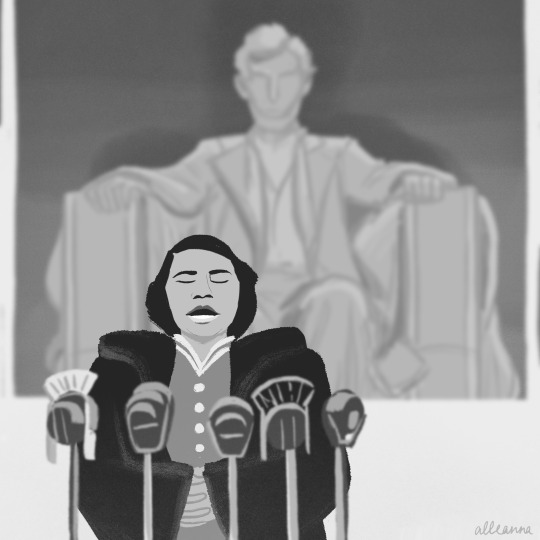
Anderson was born in 1897 in South Philadelphia. When she was 6 years old, she became a member of the choir at Union Baptist Church, where people called her “Baby Contralto.” Her father, John, was a coal and ice dealer at Reading Terminal Market , and when Anderson was 8, her father bought her a piano. Her family couldn’t afford lessons, so she taught herself.
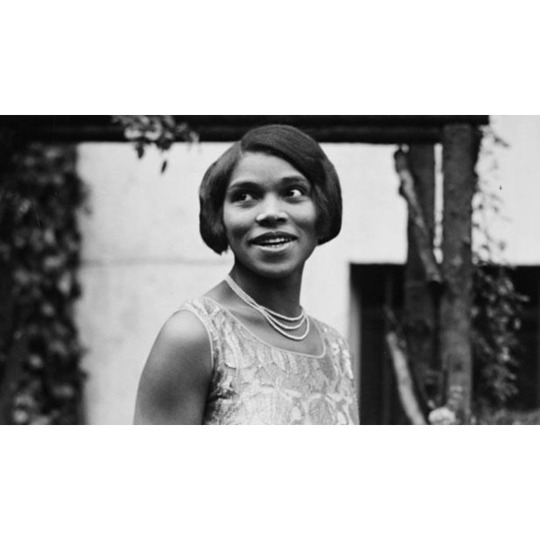
Anderson’s father passed away when she was 12, so her mother, Anna, had to raise her and her two sisters. Despite her father’s death, Anderson continued to stay committed to church and choir. Her commitment and skills impressed her choir so much that the church worked together to raise enough money to pay for her to train under a respected voice teacher, Giuseppe Boghetti.
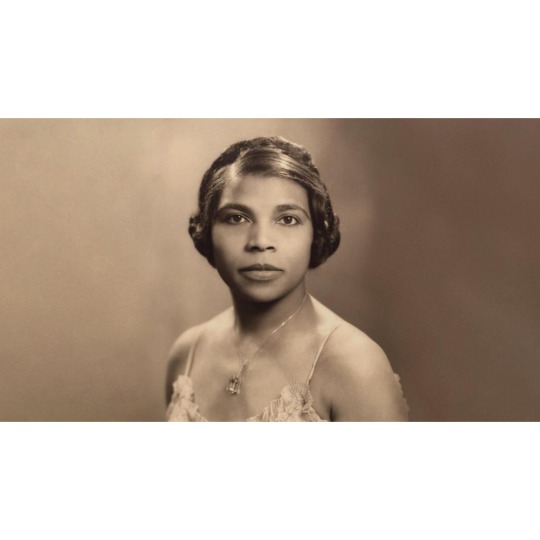
In 1928, she performed at Carnegie Hall and thanks to a Julius Rosenwald scholarship, went on tour through Europe. By the late 1930s, Marian Anderson was famous in US and Europe. In 1936, President Roosevelt and Eleanor invited Anderson to perform at the White House. She was the first Black person to receive this honor.
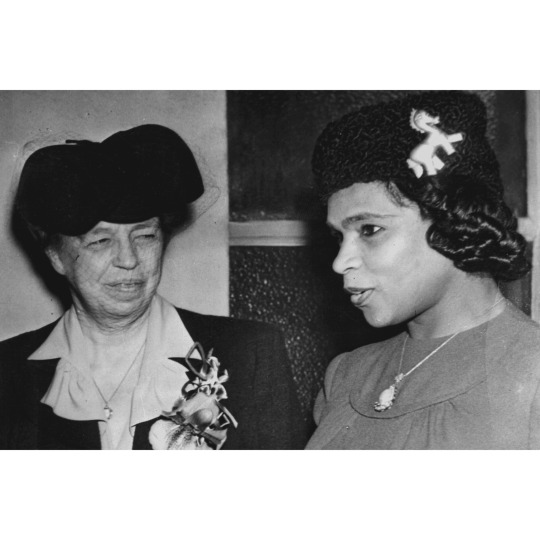
She had been scheduled to sing at Washington's Constitution Hall, but the Daughters of the American Revolution (who managed the hall) refused to let her sing because she was Black. In response, Eleanor Roosevelt resigned from the DAR, and President Roosevelt gave permission for a concert at the Lincoln Memorial. On Easter Sunday, Anderson performed "My Country, 'Tis of Thee" to an audience of 75,000 people and a NBC radio audience of millions.
In 1941, she won the Edward Bok Award for distinguished service to the city of Philadelphia. And in 1955, she became the first African American to perform at the Metropolitan Opera.

In 1961, Anderson performed the national anthem at JFK’s inauguration. In 1963, JFK honored her with the Presidential Medal of Freedom.
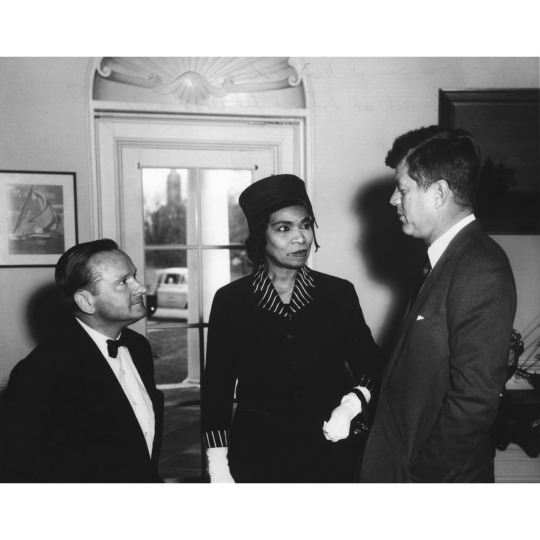
Anderson retired from performing in 1965, but she was honored with the Grammy Award for Lifetime Achievement in 1991.


I’ll be back tomorrow with another illustration and story!
#marian anderson#black history month 2023#black history matters#black history 365#artists on tumblr#illustrators on tumblr
78 notes
·
View notes
Text
ROUND 1 / SIDE B / POLL 4


Wren Blake x John Seed ( @nightwingshero ) vs Ludovica Rossi x Pier Lombardi ( @raybotonline )
Art by @beemot
who makes up your ship?:
Wren Blake and John Seed
why does your ship deserve to be considered the most toxic?:
Have tried to kill each other multiple times (she also spit in his face), banged it out, then tried to kill each other again. Have slit throats together, banged it out, then cut up some more people. They're Not The Drama. Wren killed John's sister and John kidnapped and tortured her friends because they got into a fight about Wren going to the Whitetails when called. Made out after. Literally obsessed with each other. Wren killed an ex lover of John's, John made sure she wasn't getting any anywhere else. He taught her how to kill, she taught him how to love...and to make people bleed more. Literally live in luxury and yummy foods while the sounds of the Resistance burning alive and dying are right outside. But Wren puts on some music and they dance, it's fine. They can't hear or see no evil. The Judge and the Baptist with their smiles and their bloodstained knives, how romantic. Also banged during the baptism.
ship tags/playlists/pinterest boards?:
x: two scales balanced or wren x john https://open.spotify.com/playlist/6H6tL7MUDRlCaFEIth5Hvm?si=482c7067815742df https://pin.it/2TfjqXu
****
who makes up your ship?:
Ludovica Rossi / Pier Lombardi
why does your ship deserve to be considered the most toxic?:
Well. Ludovica met Pier when the two of them were in college and they both hit it off quite well, but once they graduated and got married immediately after things started to go a bit downhill. You see, Ludovica, being an aspiring business owner, was never really in it for the love-- she was in it to make herself look good, and what looks better to the public than a woman in STEM who is still married and has a child while being the ever so responsible CEO of a robotics company? Over the 10 or so years they were together (6 of which they were married for) Ludovica grew to resent Pier and all of his shortcomings, but was at least happy he was easy to manipulate into doing whatever she wanted. After a while, she divorced Pier, but one condition set Pier off the deep end; he wasn't allowed to see his daughter Chiara ever again. This condition made Pier, for lack of better words, completely *snap*, and he ended up completely reprogramming one of HINTCORP's (the robotics company Ludovica owns and that Pier worked for) prototype assistance robots to be a killing machine, and attempted to murder Ludovica with it. He didn't succeed at all, and dissappeared completely after the murder attempt, leading everyone around him to assume he died-- in particular, Ludovica claimed to the press and the court that he had committed suicide after the fact. Pier is, of course, still alive, lurking the halls of the abandoned HINTCORP building like a ghost. For more information, here's their separate toyhouse pages-- Ludovica: https://toyhou.se/9741346.ludovica-rossi Pier: https://toyhou.se/9728723.pier-lombardi The image submitted is the two of them in their college years :-)
ship tags/playlists/pinterest boards?:
spotify playlist: https://open.spotify.com/playlist/1StZkXat6iCSVwpp1OLhAi?si=e69524c2cb65406b
#nightwingshero#raybotonline#wren blake x john seed#ludovica rossi x pier lombardi#toxic ship tournament
37 notes
·
View notes
Text

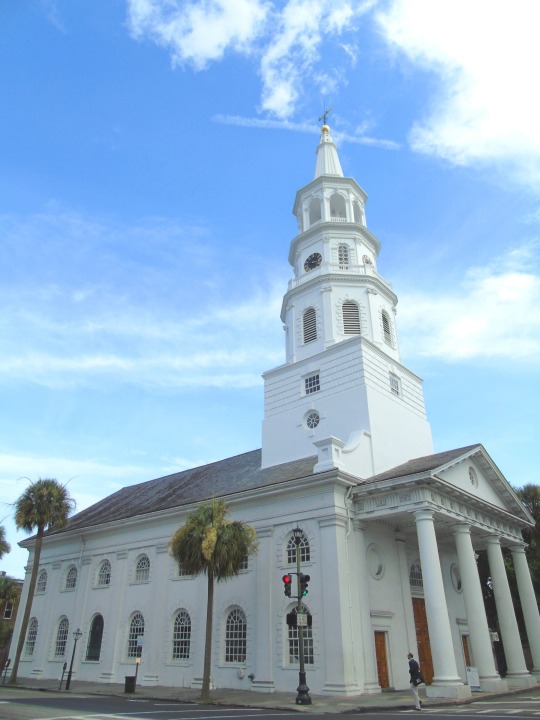

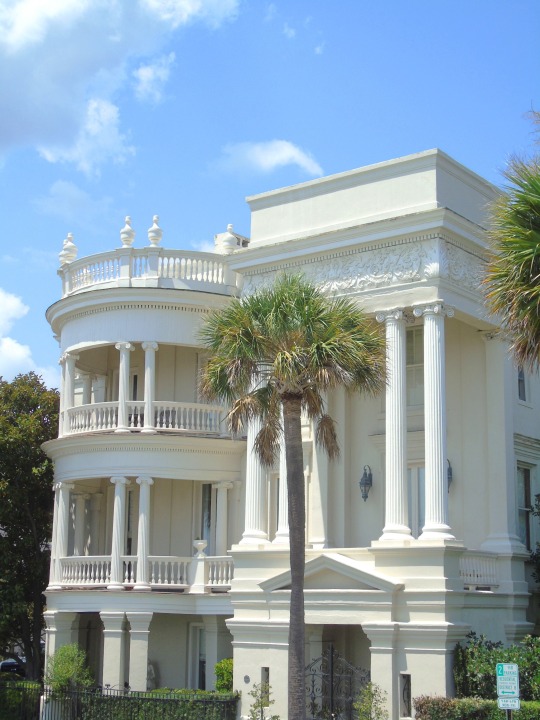
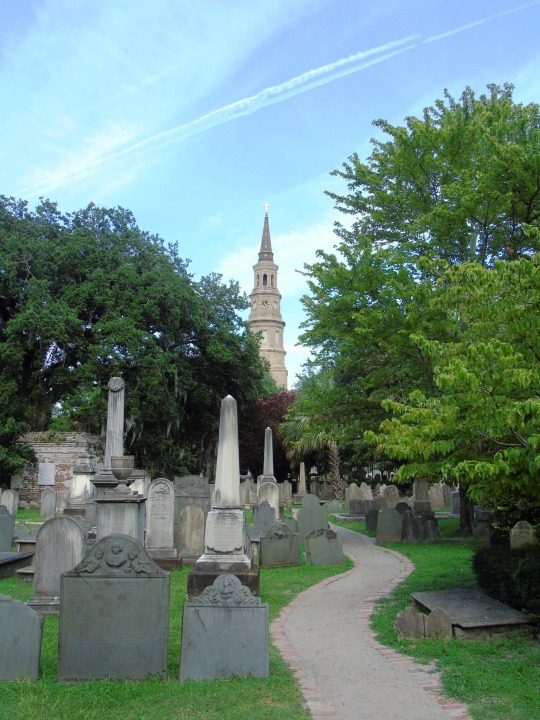
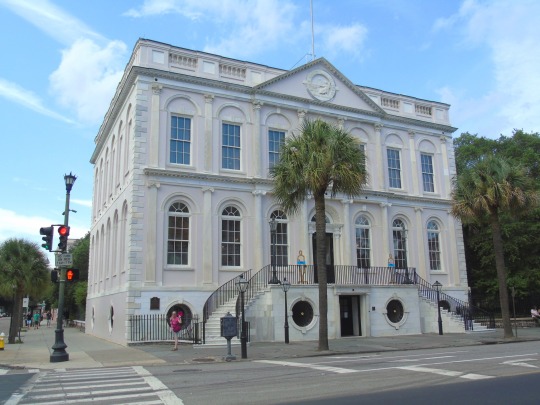


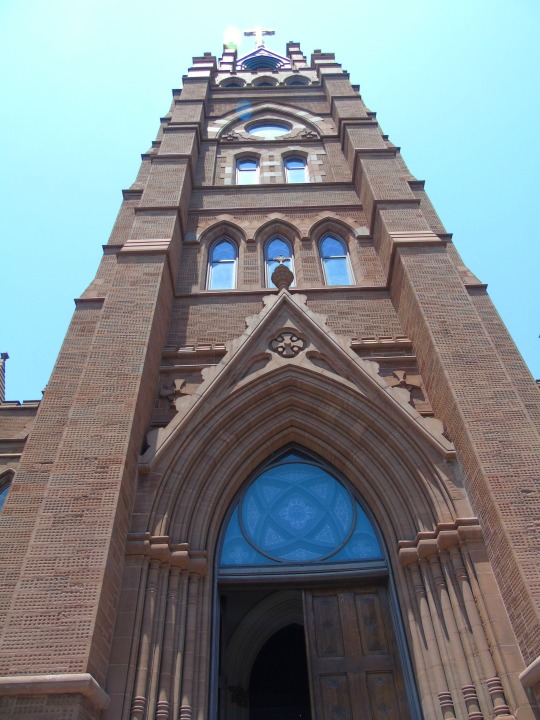

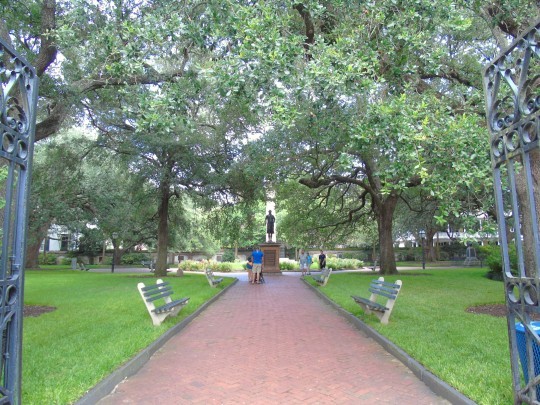
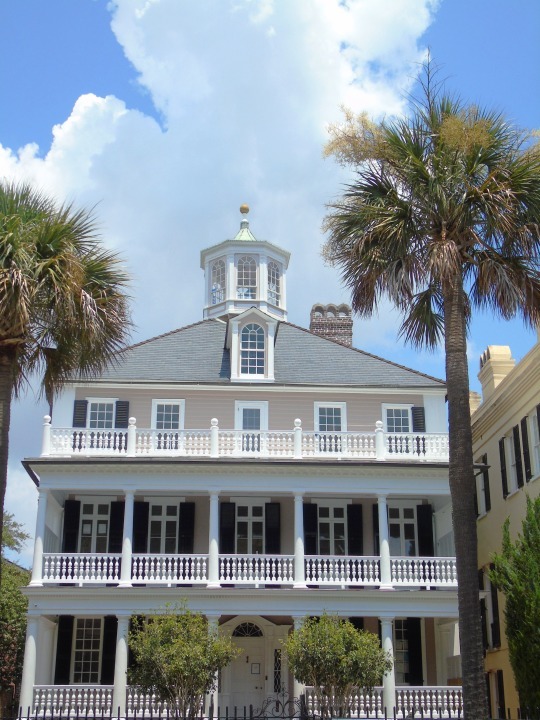
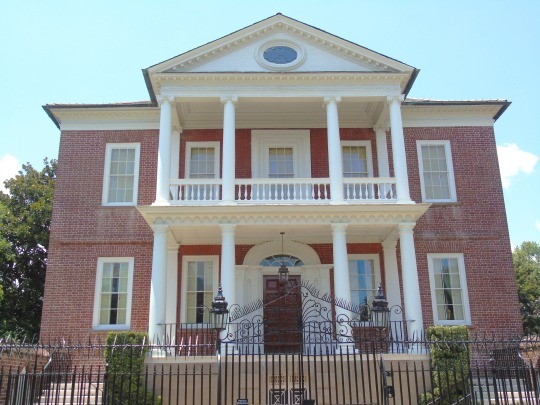
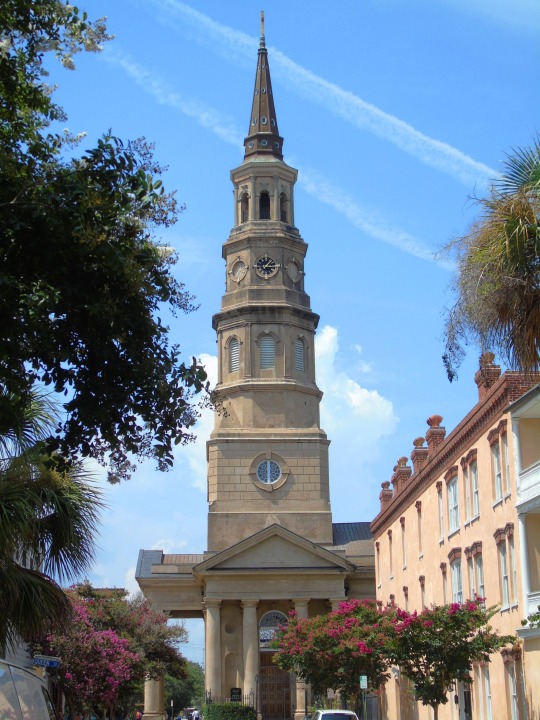




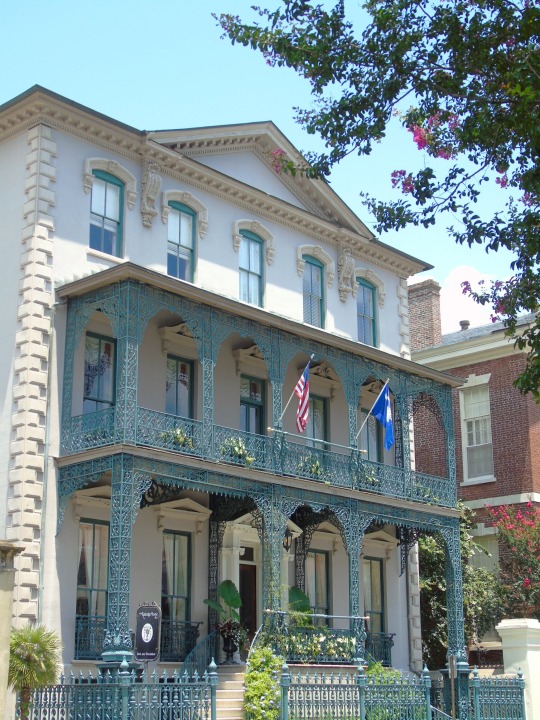
The American Revolutionary War officially ended with the liberation of Charleston on December 14, 1782.
#Louis DeSaussure House#Miles Brewton House#architecture#cityscape#USA#American Revolutionary War#American War of Independence#ended#14 December 1782#anniversary#US history#tourist attraction#landmark#city hall#Unitarian Church#St. Philips Church Episcopal West Cemetery#Cathedral of St John the Baptist#Col. John Ashe House#South Carolina#summer 2016#travel#original photography#vacation
3 notes
·
View notes
Text

30th August >> Fr. Martin's Reflections/Homilies on Today's Mass Readings for Friday, Twenty First Week in Ordinary Time (Inc. Matthew 25:1-13): ‘The bridegroom is here’.
Friday, Twenty First Week in Ordinary Time
Gospel (Except USA) Matthew 25:1-13 The wise and foolish virgins.
Jesus told this parable to his disciples: ‘The kingdom of heaven will be like this: Ten bridesmaids took their lamps and went to meet the bridegroom. Five of them were foolish and five were sensible: the foolish ones did take their lamps, but they brought no oil, whereas the sensible ones took flasks of oil as well as their lamps. The bridegroom was late, and they all grew drowsy and fell asleep. But at midnight there was a cry, “The bridegroom is here! Go out and meet him.” At this, all those bridesmaids woke up and trimmed their lamps, and the foolish ones said to the sensible ones, “Give us some of your oil: our lamps are going out.” But they replied, “There may not be enough for us and for you; you had better go to those who sell it and buy some for yourselves.” They had gone off to buy it when the bridegroom arrived. Those who were ready went in with him to the wedding hall and the door was closed. The other bridesmaids arrived later. “Lord, Lord,” they said “open the door for us.” But he replied, “I tell you solemnly, I do not know you.” So stay awake, because you do not know either the day or the hour.’
Gospel (USA) Matthew 25:1-13 Behold, the bridegroom! Come out to meet him!
Jesus told his disciples this parable: “The Kingdom of heaven will be like ten virgins who took their lamps and went out to meet the bridegroom. Five of them were foolish and five were wise. The foolish ones, when taking their lamps, brought no oil with them, but the wise brought flasks of oil with their lamps. Since the bridegroom was long delayed, they all became drowsy and fell asleep. At midnight, there was a cry, ‘Behold, the bridegroom! Come out to meet him!’ Then all those virgins got up and trimmed their lamps. The foolish ones said to the wise, ‘Give us some of your oil, for our lamps are going out.’ But the wise ones replied, ‘No, for there may not be enough for us and you. Go instead to the merchants and buy some for yourselves.’ While they went off to buy it, the bridegroom came and those who were ready went into the wedding feast with him. Then the door was locked. Afterwards the other virgins came and said, ‘Lord, Lord, open the door for us!’ But he said in reply, ‘Amen, I say to you, I do not know you.’ Therefore, stay awake, for you know neither the day nor the hour.”
Reflections (13)
(i) Friday, Twenty First Week in Ordinary Time
The parable in today’s gospel reading speaks to us about the importance of being alert to the Lord’s coming. It is a call to be ready to welcome the Lord when he comes, whether it is his coming at the end of our lives, or his daily coming. In the gospels, Jesus once referred to himself as the bridegroom and John the Baptist spoke of himself as the friend of the bridegroom. We are all friends of the bridegroom, friends of the Lord, and he looks to us to be alert to his coming, whenever it happens and whatever form it takes. In the parable, the bridegroom’s coming was unexpected, much later than had been anticipated. Only some of the bridesmaids for ready for the unexpectedly late arrival of the bridegroom; they were prepared for the long haul, having brought sufficient oil with them. As a result they were able to have their welcoming lamps burning brightly when the bridegroom finally arrived. In the darkness, they were ready to light the way to the banqueting room for himself and his bride. We each carry within us a light, a flame that burns brightly. It is the light, the flame, of our faith. It is a flame that can be kept alive by our prayerful openness to the Holy Spirit and that finds expression in the loving service of others. We are called to keep that flame of faith burning within us, for the long haul. Saint Paul certainly kept that flame of faith burning to the end. He could write to Timothy, ‘I have fought the good fight, I have finished the race, I have kept the faith’. Just after children are baptized, the priest says to their parents and godparents, ‘These children have been enlightened by Christ… May they keep the flame of faith alive in their hearts. When the Lord comes, may they go out to meet him with all the saints in the heavenly kingdom’. If we can keep the flame of faith burning for the long haul, we will be ready to welcome both the Lord’s daily coming to us and his coming at the end of our lives. We will be ready when the call goes out, ‘The bridegroom is here’.
And/Or
(ii) Friday, Twenty First Week in Ordinary Time
It is lovely to be met by someone when we arrive home from a journey. To be met by a friendly face is all the more gratifying if our arrival has been delayed. Recognizing the hoped-for presence in the crowd, despite our very late arrival, makes us all the more appreciative of their coming. They have been faithful, in spite of the inconvenience of the unexpected delay. The bridegroom, in today’s parable, who turned up late must have been equally pleased to find that at least some of the bridesmaids were there to meet him with torches lit and to escort him to the wedding banquet, in spite of his late arrival and their long wait. After speaking the parable, Jesus turned to his disciples and said to them, ‘Stay awake, because you do not know either the day or the hour’. The Lord was calling on them to be faithful to him, especially during those times when he seemed absent and their expectations of him were not coming to pass. When the Lord calls us to be his followers, it is always for the long haul; he looks to us to keep our light burning right to the very end, through the good times and the bad times. Earlier in Matthew’s gospel Jesus had addressed his disciples as the light of the world and called on them to let their light shine so that people might see their good works and give glory to God for them. Keeping our lamp burning, letting our light shine to the end, amounts to doing the good works the Lord calls on us to do, for as long as we are able to do them, so that when he comes he will find us at our post, ready to welcome him.
And/Or
(iii) Friday, Twenty First Week in Ordinary Time
Jesus often spoke of the kingdom of God as a wedding feast. It connected in with the understanding of God as the bridegroom and of the people of God as God’s bride, which is often found in the books of the prophets. In the gospels Jesus is sometimes portrayed as the divine bridegroom; John the Baptist is described in the fourth gospel as the friend of the bridegroom. The parable Jesus speaks in this morning’s gospel reading is about the coming of the Lord, of the bridegroom, at the end of time, and the need to be ready for his coming. Of the five bridesmaids assigned to welcome the bridegroom, only five of them were ready with their torches lighting. The parable calls on all of us to keep our own torches lighting so that when the Lord comes at the end of our lives he will find us ready. What does it mean to keep our torches lighting? Earlier in Matthew’s gospel, at the beginning of the Sermon on the Mount, Jesus called on us to let our light shine by means of our good works, works of love, mercy and justice. This is what Paul refers to in the first reading as ‘the life that God wants’. It is the kind of life which will keep us ready at all times for the Lord’s coming.
And/Or
(iv) Friday, Twenty First Week in Ordinary Time
Many of us are fortunate to have so many good shops around us. If we run out of something we can go to the shops and purchase what we need. The parable in the gospel reading this morning speaks of five bridesmaids who discovered they had run out of oil for their lamps. However, they made this discovery too late. The bridegroom was on the point of arriving. They were at the shops when they should have been part of the procession leading the bride and the bridegroom to the bridegroom’s house for the wedding feast. In the parable the bridegroom is clearly a veiled reference to the Lord who, in the course of the gospels, speaks of himself as the bridegroom. The parable calls on us to have a good supply of oil at all times to keep our lamps burning because we do not know when the bridegroom will arrive. It is a call to faithfulness, to be at our post at all times. Earlier in Matthew’s gospel Jesus addresses his disciples as the light of the world. We are to keep that light burning brightly by our good works, by continuing to hear the word of the Lord and to keep it in our lives. That is the call that is addressed to us every day, and every day we try to respond to it so that whenever the Lord comes we are ready. When does the Lord come? He comes not just at the end of our lives but every day of our lives. At the end of Matthew’s gospel he says to his disciples, ‘I am with you always, to the end of the age’. We need to be ready every day.
And/Or
(v) Friday, Twenty First Week in Ordinary Time
The parable in this morning’s gospel reading reflects a marriage custom in the time of Jesus whereby bridesmaids waited at the bride’s house for the arrival of the bridegroom. When he arrives they go out to meet him with lighted torches and then they escort the bridegroom and his bride to the house of the bridegroom where the marriage feast is ready and the guests are waiting. What distinguishes the five bridesmaids who are described as ‘sensible’ from the other five is that, when the bridegroom arrived much later than expected, they had enough oil to ensure that their torches did not go out. They were able to welcome the bridegroom as was expected of them and escort him and his bride to the bridegroom’s house. In the gospels, Jesus refers to himself as the bridegroom. The parable encourages us to have our torches blazing brightly when the Lord comes to us, whenever that might be. Earlier in the gospel of Matthew, Jesus had said to his disciples, ‘You are the light of the world... let your light shine before others so that they may see your good works’. The parable could be calling on us to keep the light of our good works shining. We are not to allow that light to go out; we need to keep it burning for the long haul. We are to keep the flame of faith which shows itself in good works alive in our hearts to the very end. When the bridegroom, the Lord, comes at the end of time or at the end of our own earthly time, he will hope to see the flame of our loving faith burning brightly. The Lord who comes to us at the end is the Lord who is present to us now. If we are to welcome him with torches burning brightly at the end, we need to open ourselves to the oil of his presence now. We will stay the course only with the Lord’s help. We need to keep opening ourselves to the resource only he can give us if we are to reflect that light back to him at his final coming.
And/Or
(vi) Friday, Twenty First Week in Ordinary Time
One of the mottos of the scout movement is ‘Be prepared!’ Before they went hiking they had to make sure they had all they needed to meet with any unexpected eventuality that may arise. Five of the bridesmaids in this morning’s gospel reading wouldn’t have made good scouts. They weren’t prepared for the late arrival of the bridegroom and, as a result, their oil had run out and they couldn’t escort the bridegroom with their lighted torches as was expected of them. When the procession set off they were at the shops. By the time they arrived back, the moment had passed, the banquet had started and the big heavy doors of the banqueting room had already been locked and no one was going to open them for them. The parable calls on us to be ready with our lamps brightly burning whenever the Lord, the heavenly bridegroom, comes, whether that is at the end of time or at the end of our lives. Just after a child is baptized the godfather is invited to light the baptismal candle from the Easter candle and the priest says, ‘Parents and godparents, this light is entrusted to you to be kept burning brightly’. As the child becomes an adolescent, at the time of the Sacrament of Confirmation, he or she has to take responsibility to keep the light that has been entrusted to them burning brightly. The parable calls on us to keep this light of Christ, the light of faith, burning brightly, and not allow it to go out completely. Then whenever the Lord comes, be it early or late, we will be ready to welcome him, and the light of our faith will give way to the eternal light of the Lord’s presence.
And/Or
(vii) Friday, Twenty First Week in Ordinary Time
Behind today’s gospel reading is a marriage custom that we cannot be fully sure of today. The custom may have been for a group of unmarried young women to go to the family home of the bride on her wedding day and to wait with her for the bridegroom to arrive. When the bridegroom arrives, these women would go meet him with blazing torches. They would then accompany the bride and bridegroom to the bridegroom’s house for the celebratory meal, all the while holding their blazing torches aloft. In the story, five of the ten members of the welcoming group of women discovered too late that they did not bring enough oil to keep their lamps burning for the important role they were expected to play. By the time they bought the necessary oil, the welcoming procession was over, the meal had started and the heavy door of the banqueting room had been shut. In that culture, this would have been a very shameful experience for these women. It would have taken a while for them to live it down. The message of the parable is clear. We need to be ready to meet the Lord, the bridegroom, when he comes, whether that is at the end of time or at the end of our lives or, indeed, in the course of our daily lives. We need to keep the light of our faith burning. Earlier in Matthew’s gospel, Jesus called upon his disciples to let their light shine, the light of their faith, so that people could see their good works and give glory to the Father in heaven. We let the light of our faith shine when our faith expresses itself in good works, in works of loving service of others. Saint Paul in one of his letters speaks about faith expressing itself in love. This is the faith that burns brightly, and the parable assures us that such faith will leave us ready for the Lord’s coming whatever form that might take.
And/Or
(viii) Friday, Twenty First Week in Ordinary Time
It is lovely to be met by someone when we arrive home from a journey. To be met by a friendly face is all the more gratifying if our arrival has been delayed. The bridegroom, in today’s gospel reading, must have been pleased to find that at least some of the bridesmaids were there to meet and escort him to the wedding banquet, in spite of his very late arrival. The faithfulness of at least some of the bridesmaids was all the more appreciated, because it required foresight and attentiveness. We value faithfulness in others, especially when we know that it has cost them something. We appreciate it when people keep vigil for us, when not to do so would be very understandable. Having finished telling the parable of the ten bridesmaids, Jesus turned to his disciples and said to them, ‘Stay awake, because you do not know either the day or the hour’. He was calling on us to be faithful to him, to stay the course, no matter how long it is. When he addresses us as ‘the light of the world’, he looks to us to keep the flame of the gospel burning in our hearts and in our lives, so that the light of that flame is there to greet him, regardless of the lateness or strangeness of his coming to us. In the times in which we live, it can be a struggle to keep the flame of faith alive in our hearts. Like some of those in the gospel reading today, we may find ourselves crying, ‘Our lamps are going out’. Yet, the light of Lord’s presence in our lives does not grow dim. He remains faithful to us, to the end. His faithful presence to us will help us to keep the flame of our faith burning even when the times are dark.
And/Or
(ix) Friday, Twenty First Week in Ordinary Time
Today’s first reading is taken from Paul’s first letter to the Thessalonians, which is the earliest Christian document to have come down to us, dated to about twenty years after the death and resurrection of Jesus. In that reading, Paul says, ‘What God wants is for you all to be holy’. How did Paul understand ‘holiness’? The end of that reading gives us a clue. Having declared, ‘We have been called by God to be holy’, he immediately goes on to speak of God ‘who gives you his Holy Spirit’. In other words, ‘holiness’ for Paul is a life that is shaped by the Holy Spirit, a life that is rich in what he calls elsewhere ‘the fruit of the Spirit’. You are probably familiar with Paul’s portrayal of the fruit of the Spirit, ‘love, joy, peace, patience, kindness, gentleness, and self-control’. This is Paul’s depiction of a holy life, a life lived according to the Holy Spirit. This is our baptismal calling, which flows from our baptismal identity, our Spirit-shaped identity. The parable that Jesus spoke in today’s gospel reading contrasts those bridesmaids who were ready to welcome the bridegroom with their lamps burning and those who were not. To the extent that we allow the Spirit to shape our lives, to bear fruit in our lives, we will be standing reading with lamps burning to welcome the Lord, the bridegroom, whenever he comes. He comes at the end of our lives but also in the course of our daily lives. In all the ways he comes to us, he will be hoping to find that our lives are burning brightly with the flame of the Spirit.
And/Or
(x) Friday, Twenty First Week in Ordinary Time
I am often struck by that line in today’s gospel reading, ‘The bridegroom is here! Go out and meet him’. In the parable the bridegroom’s coming had been delayed. Only some of the bridesmaids had enough oil to light their lamps and greet him, in spite of his unexpected delay. They alone were ready to escort him through the darkness with their lamps alight towards the bride’s house. These wise bridesmaids, as they are called, were ready for a possible late arrival of the bridegroom; they had prepared themselves for the long haul. To each of us it could be said, ‘The bridegroom is here! Go out and meet him’. The bridegroom is the Lord. In the gospels Jesus spoke of himself as the bridegroom; in and through him, God was renewing the marriage covenant with his people. Every day of our lives the Lord is here, and every day we are invited to go out and meet him. We are called each day of our lives to welcome the Lord’s coming to us, even when his coming is late and unexpected, even though he may come to us in ways that seem strange or foolish from a human point of view. As Paul says in today’s first reading, God’s wisdom is often experienced as foolishness to humans. We are to welcome the Lord each day with our lamps burning, with the flame of faith and the fire of love alive in our hearts. The Lord’s coming to us each day is assured and he looks to us for a faithful and reliable response to his coming. The Lord is here for us, and he asks us to be there for him, like the wise bridesmaids. Like them, we need to be there for him for the long haul. Even when the Lord seems absent, we need to keep the flame of our faith and the fire of our love brightly burning. We can be tempted to give up on the Lord, like the foolish bridesmaids, perhaps thinking he has given up on us. The Lord never gives up on us; he is faithful to us, to the end, and he looks for the same faithfulness in us.
And/Or
(xi) Friday, Twenty First Week in Ordinary Time
In today’s parable one group of bridesmaids say to the other group, ‘Our lamps are going out’. Perhaps we can all feel as if our lamps are going out from time to time. The flame of our faith is just about flickering. On one occasion, Jesus spoke about the ‘smouldering wick’. He identified himself with the servant in the prophet Isaiah who did not ‘quench the smouldering wick’. Jesus came to fan people’s faith into a living flame. In his second letter to Timothy, Paul calls on him to ‘rekindle the gift of God that is within you’. Our faith and the love that flows from it needs rekindling, fanning into a living flame, from time to time. Who does that rekindling, that fanning? It is only the Lord who can do it through the Holy Spirit. That is why I like the prayer to the Holy Spirit, ‘Come Holy Spirit, fill my heart and kindle in me the fire of your love’. We could also ask the Holy Spirit to rekindle in us the flame of our faith as well as the fire of his love in our lives. Authentic faith is always a faith that expressed itself in love. In the gospel reading, five of the bridesmaids were not prepared for the delay of the bridegroom; they turned to the other five and said ‘Our lamps are going out’. They couldn’t stay the course when the course turned out to be longer than expected. The Lord looks to us to stay the course, to finish the race, to keep the flame of faith and the fire of love burning brightly within us, to the very end of our lives. If that is to happen we need to keep turning to the Lord and the Holy Spirit who will see to it that we reach the goal of our life journey with our lamps burning brightly.
And/Or
(xii) Friday, Twenty First Week in Ordinary Time
It seems that in the time of Jesus young unmarried women waited with the bride at her family home for the arrival of the bridegroom. Then when he arrived they would escort the couple with lighted lamps to the house of the bridegroom where the marriage feast had been prepared and the guests were waiting for the couple’s grand entry. It was an important task for these bridesmaids to accompany the couple and to guide them through the darkness with lamps burning brightly. It would have been very embarrassing if they didn’t have enough oil to keep their lamps lighting for the length of the procession to the house of the bridegroom. In the parable, five of the ten bridesmaids discovered at the last moment that they didn’t have enough oil for their role of accompanying the married couple. ‘Our lamps are going out’, they cried. Jesus may be saying to us that we need to keep the lamp, the flame, of our faith burning brightly to the very end, and not allow it to go out. At the baptism of a child, when the godfather lights the baptismal candle from the Paschal candle, the priest says to the parents of the child, ‘keep the flame of faith alive in his/her heart’. That is our baptismal calling, to keep the flame of faith alive in our hearts and to allow our faith to show itself in the loving service of others. Elsewhere in the gospel of Matthew, Jesus says to his disciples, to us all, ‘You are the light of the world… let your light shine before others, so that they may see your good works and give glory to your Father in heaven’. We are called to let the light of the gospel shine through us, for the long haul, and to do that we will always need the help of the Holy Spirit, who kindles in us the fire, the flame, of loving faith.
And/Or
(xiii) Friday, Twenty First Week in Ordinary Time
In today’s first reading, Paul reminds us of our baptismal calling, which is ‘to be holy’. He describes a holy life as living ‘the life that God wants’. Paul also says that God gives us his Holy Spirit to enable us to live holy lives. In that sense, a holy life is a life that is shaped by the Holy Spirit, a life in which the Holy Spirit bears fruit. In another of his letters Paul portrays the fruit of the Holy Spirit as love, joy, peace, patience, kindness, generosity, faithfulness, gentleness and self-control. Holiness finds expression in these qualities. It is significant that ‘love’ appears first in that portrayal of the fruit of the spirit. The other qualities are various ways love is revealed, such as patience, kindness, generosity, faithfulness, gentleness and self-control. The Holy Spirit that has been poured into our hearts is the Spirit of God’s love, and these are all outward expressions of that Spirit. The expression of love that is highlighted in today’s gospel reading is faithfulness. Only five of the ten bridegrooms were faithful to the bridegroom and his bride. They were there with their lamps burning brightly when the bridegroom arrived at the bride’s home, ready to accompany them both to the house of the bridegroom, where the marriage feast had been prepared and the guests were waiting. They faithfully kept watch with their lamps alight, even though the bridegroom was late arriving. Our love for the Lord shows itself in being faithful to him, even during those dark hours when he seems absent and we wonder where he is to be found. Our love for others also expresses itself in a readiness to be faithful to them, in some way, even when they keep us waiting and let us down.
Fr. Martin Hogan.
4 notes
·
View notes
Text
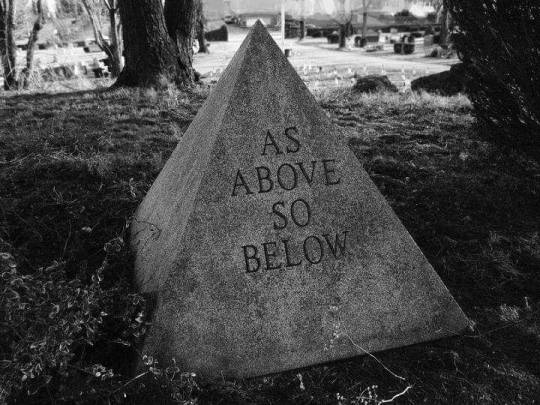
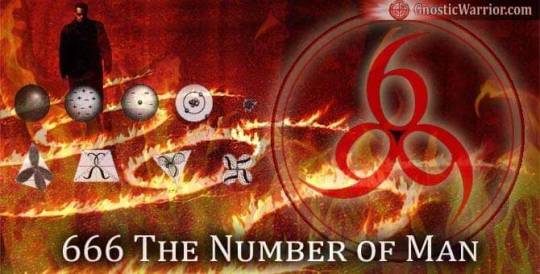

As Above, So Below....
"As above, so below, as within, so without, as the universe, so the soul" - Hermes Trismegistus As above, so below
The term, "As above, so below" was recorded in the Hermetic texts from The Emerald Tablet of Hermes Trismegistus, which states: "That which is Below corresponds to that which is Above, and that which is Above corresponds to that which is Below, to accomplish the miracle of the One Thing."
In the heavens above, the planet's energies are that which is so below on earth. We humans who live on the so below are made of these same heavenly energies of that which is as above. Hence, the microcosm is oneself, and the macrocosm is the universe.
Manly P. Hall had said, "We are the gods of the atoms that make up ourselves, but we are also the atoms of the gods that make up the universe"; and Paracelsus says that man's spirit comes from the stars, his soul from the planets, his body from the elements. More recently Carl Sagan had said quite simply, “we're made of star stuff.”
Our immortal souls belong to the Creator like the stars in the heavens.
Humans are made of the heavens who are found among the stars and planets. The heavens on the AS ABOVE is the macrocosm, and we humans on the SO BELOW, the microcosm. The same chemical energies found in the AS ABOVE stars such as phosphorus, hydrogen, sodium, Sulfur, magnesium, and iron can be found in almost all living organisms including we humans on the SO BELOW.
Like a star that burns bright, we can also burn out and fall like Lucifer. AS ABOVE, SO BELOW. A dying star that once belonged to the Creator becomes ash, just as with the fall of man, his immortal essence also becomes mortal ash.
The as above so below is also the hidden secret biblical alchemical science of the allegorical stories behind the veiling of 666, the beast or Revelation, Lucifer, and Jesus Christ. I have written about this hidden alchemy in the bible many times before in articles such as The Science of 666, The 7 Stars and 7 Golden Lampstands of DNA and From Atom to Adam to Red Man.
The number 666 relates to the carbon atom and man. Carbon is abundant in the Sun, stars, comets, and in the atmospheres of most planets. Carbon-12 is one of the 5 elements that make up the human DNA; being composed of 6 protons, 6 electrons and 6 neutrons, which equates to 666. Its abundance is due to the Triple-alpha process by which it is created in stars.
John the Baptist said of the coming Antichrist and the Number of the Beast: “ Let him that hath understanding count the number of the beast : for it is the number of a man; and his number is Six hundred threescore and six.” John was telling us that we are that beast, and the antichrist. 666 is simply the number of man, and this can be proven by modern science.
Lucifer, the fallen angel is the Latin word for the Greek word phosphorus (Greek Φωσφόρος Phōsphoros); a name meaning “Light-Bringer.” The phosphorus atom is of the nitrogen family, but having that characteristic of firing. Hence, the term light bringer for this is the very chemical energy that next to calcium, phosphorus is the most abundant mineral in the body used primarily for energy production, growth and the repair of body cells and tissues. It is the very energy that you need to think, live, create and yes, even have sex with to create babies to further evolve or devolve your family blood line.
God said, let there be light, and there was light.
The very chemical energy known as the Greek phosphorus that makes us human; and like the Latin Lucifer, we too can fall and devolve. Or we can simply rise above the matrix and become like Jesus; leaving the earthly world behind by dying on the cross on the so below, in order to rise to the heavens on the as above to become spiritual beings who are lights in the world. Illuminated teachers and angels that guide those people who are less fortunate to do the same.
These truths are the basis of the human science of chemical energies of the as above and so below known as alchemy, and the science of an inner spiritual knowledge called gnosis. Two ancient sciences that are some of the least understood by current humanity. This selfish ignorance of their pasts that often leads to their early mortality, in which the evolution of their soul is simply not occurring.
Our goal with our lives is to evolve, not devolve. To rise above, not fall below. To love and be loved. Hence, those humans who do not know their pasts, simply never last. Those who live a lie always die, and those who live by truth never die.
Life is a journey in which we each take our own paths, and find our own truths. To find truth and happiness, we all need to play our own tune in accordance with each of our own chosen paths, spiritual gifts and worldly talents. Be still, withdraw from the world of illusions and just be yourself. In a sense, be happy with what the creator has given us and also do not waste our lives by becoming fallen angels doomed to devolve in our own man-made hells for eternity.
If we all play our own tune with these spiritual gifts that we have been given, we can then begin to repair our damaged selves, and then be a light in the damaged dark world that we live in. Find that philosopher's stone that is within each one of us.
In a sense, create heaven on earth.
AS ABOVE, SO BELOW and AS WITHIN, SO WITHOUT.......
{{The Seven Principles of the Universe}}:
1. Principle of Mentalism: “All is Mind”
2. Principle of Correspondence: “As is above, so is below. As is below, so is above.”
3. Principle of Vibration: “Nothing rests; everything moves; everything vibrates.”
4. Principle of Polarity: “Everything is dual; everything has an opposite, and opposites are identical in nature but different in degree.”
5. Principle of Rhythm: “Everything flows, out and in; the pendulum-swing manifests in everything; the measure of the swing to the right is the measure of the swing to the left- rhythm compensates.”
6. Principle of Cause and Effect: “Every cause has its effect; every effect has its cause.”
7. Principle of Gender: “Everything has its masculine and feminine principles.”
20 notes
·
View notes
Text
ch. 8 — frician (to desire)

notes: margaret by lana del rey was a big inspo for this one
summary: alethia arrives in kattegat
warnings: i dont want to give it away tbh. in a good way i promise!!!! jack we talked about this literally last night (its not to that extent but still hehe)
tagged: @demon-of-the-ancient-world @levithestripper @grantairescurls
general masterlist | series masterlist
Alethia
Lagertha was kind to her. She was glad that she did not end up alone, as she had feared, and yet, there was the perpetual feeling of only being wanted because she was linked to Athelstan.
They all stared.
She knew they whispered.
Still, Alethia boarded ship, successfully this time, making for Kattegat. Ecbert could not stop her, and she was not inclined to stay any longer than she had to. If only she could have felt as if this was where she was meant to be.
In truth, Alethia had no idea if this was the right thing to do. What if she was messing everything up, ruining things for Athelstan? This was his life, not hers, and it felt like she was intruding.
And still, Alethia followed Athelstan like John the Baptist, quiet like a shadow. In Kattegat, Athelstan helped her onto the docks. It was only when she touched those wooden planks that Alethia felt free.
She breathed in the salty air that was no different from the sea mere moments ago, and yet, entirely something else. This was to be her new home. Alethia would make it work, she had practiced enough for this moment for the entirety of her childhood.
The eyes glued to her back were there when Athelstan squeezed her shoulder, her hand, looked into her eyes with that gaze meant to comfort were not lost on Alethia. Rollo, Floki, Ragnar, Lagertha – they would not look away. Alethia wanted to turn around and hiss at them as she would have with King Ecbert, but instead, she ducked away and towards the Great Hall, disappearing in the feast that was being hosted for the return of the Vikings.
Athelstan kept his distance, as he had since they had met again. Alethia knew that there would be a gap between them, some sort of irrevocable change upon reunion, and yet, she ached for things to return as they had been.
They never had, not since she’d been a girl. And in that moment, Alethia felt ancient.
The woman with the feline eyes approached her a few hours into the feast, when Athelstan was still being held close by Ragnar, and most of the crowd had surmised to get drunk instead of doing anything meaningful for the remainder of the night. Alethia backed herself into a corner, where a cat curled around her ankles and she could nurse a cup of mead in peace.
Alethia knew that she was a queen the moment Aslaug approached her. She held herself with the same inherent dignity as Catelyn Stark had, as Sansa had. Alethia straightened her back, pushing herself up. The cat jumped away, disturbed by her sudden movements.
“Queen Aslaug.” Alethia said, bowing her head.
“How do you know who I am?” Aslaug asked. She was holding a bundle in her arms, the babe whom Alethia presumed to be Ivar sleeping lightly.
“You hold yourself as I would expect of a Götland princess.”
Aslaug raised one of those well-manicured brows, but she gave Alethia a small smile.
“Then you are the woman that plagues my dreams.”
“Sorry about that.” Alethia said.
“You have an accent.”
“Sorry about that as well.”
“It is all fair and well. I expect Athelstan has been teaching you to the best of his abilities.” Aslaug said. She took a seat next to where Alethia had been, patting the free space. The cat returned to Alethia’s lap.
“I dreamt of you. I am not… friends with Athelstan as my husband is, but I think in this, I understand him better than Ragnar does.”
Alethia looked down, scratching the cat between his ears.
“He loves you.” Aslaug whispered. Alethia paused, her heart beating wildly in her chest. When she looked over to Aslaug, the Queen of Kattegat was smiling.
Alethia did not know what to say, swallowing. She looked back down, clearing her throat, and a small laugh escaped Aslaug.
“Do you love him?” she asked. Alethia wanted to say yes, but the guilt of it strangled her, and she could not say a single thing. Aslaug sighed.
“You are good for him. He is not someone I understand very well, but Athelstan is a man who has suffered greatly. Even if he is a Christian, I can see that.”
“Thank you.”
“It is nothing.”
“It is everything.” Alethia protested. Then, she leaned back against the wall behind her, resting her head. “I was afraid of you, you know?”
“Me? I am not someone invocative of fear.” Aslaug replied.
“Please. You are a Götland princess. A völva. You see things others do not. I am not afraid of warriors. They all try to kill me, but so far, none of them have succeeded. Those that see beyond the fog of reality, they are the ones that scare me. You, Queen Aslaug, are one of them. You have my respect, and my admiration, no matter what others say about that.”
Now it was Aslaug’s turn to be speechless, but Alethia could not stay silent. She had to continue. The words built on the back of her tongue, forcing themselves out of her mouth.
“You are brave, too. I heard of Ivar and his disability. From what I understand of your culture, Northmen despise what they perceive to be weakness. I knew a boy like Ivar once. His name was Bran, and he was one of the most powerful men alive. No one thought he would survive what happened to him, but he did. Your Ivar… you have a right to love your son. He needs you.”
“Thank you.” Aslaug said. “And I… I know what happened to you. Most of it, anyway. The correct way to address you should be Queen, and not simply your name.”
“Please, do not.” Alethia replied.
“I won’t.” Aslaug promised. “I do not know how much the Gods showed me of your life, but I hoped that what I did see was all of the pain you experienced. It is enough for ten lifetimes.”
Alethia’s heart caught in her throat. She tried to stop the tears that pricked her eyes, right until she looked at Aslaug. When the Queen smiled at her, cold facade from a few hours ago gone, Alethia let them fall. She gave herself three minutes of respite before she cleared her throat.
“Queen Aslaug, may I ask a favour of you?”
“Almost any.” Aslaug replied.
“May I protect you? I would be honored to serve you and your children as a shieldmaiden, for I know you left many of yours behind when you came here. I do not wish to go to war anymore, but protecting a family, to protect children – that I can do. It is the sort of fierce gentleness I wish to embody.”
“Give it three moons. Rest. Then, we shall speak of what you have asked.” Aslaug promised. “But now, go. Find your priest. Do well by him.”
“I will.” Alethia promised. She did not expect Aslaug to cup her jaw, to lean forward the way she did, as if she was reading something behind Alethia’s eyes. The moment passed, Alethia shuddered, and then, she left. Aslaug turned to her son.
Athelstan
Ragnar whistled as Alethia approached them. Neither he nor she turned to look at the King. Alethia only stared at him, eyes somewhat bewildered. She looked lost, as if she’d forgotten where she was. Athelstan was fully aware that all eyes were on him as he crossed the distance between them and touched Alethia’s shoulder.
She looked right at him, green eyes boring into his own.
“Are you alright?”
Alethia looked down, and then back up at him again. She closed her eyes. “I need a break please.”
“Of course.” Athelstan said. “Go wait outside for me. I’ll be out in a moment.”
Alethia nodded, slinking towards the door. Athelstan turned to Ragnar, who had a shit-eating grin on his face. In that moment, Athelstan could not laugh at it.
“Nothing smart, Ragnar. Not tonight.” he said. Then, Athelstan followed Alethia outside. She was picking at her nails when he found her, and Athelstan watched as she hissed under one particularly painful tear. Suddenly, he was reminded of his mother. When Lillian had bad dreams, she would do the same thing. She had destroyed herself in the process.
Athelstan knew he was his mother’s child.
It was why he put an arm around Alethia, guiding her through the empty streets of Kattegat. Everyone was still in the Great Hall, celebrating. Everyone but the two of them.
He did not know why he brought her to his longhouse, but Athelstan felt the palpable sort of relief when the door to his home shut them out of the world outside.
Alethia spotted the portraits immediately. Athelstan had forgotten they were there, not having packed them away before he left for the raid. She went to them immediately, staring with wide eyes.
Gently, Alethia picked up a portrait of Floki, staring right at the viewer. Athelstan tried to swallow down his fear, stepping towards Alethia to explain.
“Athelstan these are…”
“I know I shouldn’t have.” Athelstan replied.
“What do you mean? They are beautiful. This one right here, it is exactly how Floki stares at you when you say something he does not like. And this one-” Alethia grabbed another piece of parchment, this time of Ecbert looking down at the subject. “It is exactly how King Ecbert sits his throne. Are there more?”
Athelstan hesitated. Of course there were. There was an entire sketchbook dedicated to Alethia , but he was not sure if he wanted to tell her that.
His silence was enough for her. “May I see them? Please? Your art is so beautiful.”
Art? His portraits were art?
“It is blasphemy.” Athelstan replied, shame making it difficult to breathe.
“Blasphemy? Athelstan, there are many things in this world that are blasphemy. This is not one of them. Trust me, I know.”
“How?”
“Because I love art. I have seen much of it. Van Gogh, Monet, Kahlo, Rubens, Gentileshi, Rembrandt, Michelangelo – you name it, I know it. Your portraits have spirit. Do you know the most important thing about art, Athelstan?”
“Portraiture must be used to portray the life of Christ. To display our belief to the world.”
“No.” Alethia shook her head. “No, that is not art. That is illustration. Art is that which makes you feel something. These portraits are that.”
Athelstan did not notice the tears until they tracked down his cheeks. He could not move, did not stop Alethia when she grabbed a small journal from his table. She looked at him with raised brows, and Athelstan nodded softly. Alethia opened it, and froze immediately.
He prayed she would not turn away from him for this. Alethia sat on his chair, looking at the first page. It was a portrait of her the day she had arrived in Ecbert’s villa. Alethia’s hand ghosted over her own features, careful not to touch the charcoal and smudge it. After a moment, she flipped to the next page. It was her side profile, this time sketched right after a long lesson of English grammar.
Her sitting on the edge of the roman bath followed, then Alethia balancing a sword, then only a collection of her features that Athelstan had practiced with, all disconnected. There was a sketch of her hand on her shoulder, tugging on an old scar. That was from the bath after Alethia had lost her child. Then, there was Alethia sharpening a dagger, Alethia talking to a serving girl, Alethia, Alethia, Alethia…
She paused on the page where Athelstan had sketched her right after the battle against the Northmen. Athelstan had struggled with it, because he had never drawn someone with nothing in their eyes. Portraying someone’s gaze to be empty was a thing of the almost-impossible. Alethia set down the journal, returning it to its rightful place, and Athelstan awaited judgement.
“Thank you.” Alethia whispered. “You have made me immortal in the only way I wish to be.”
Athelstan was a selfish man. “Which way?”
“That of love. I see your devotion, Athelstan. I see it in every line of each portrait. And then I have to look back up to you with empty hands in search of some way to thank you, and I have nothing. I am a beggar. I wish I had something to show for mine own character.”
“You need nothing.”
“I know. I know, but I wish to give you something, Athelstan.”
“Why did you trust me? Why did you tell me your secrets when you could tell me nothing else?” Athelstan asked.
Alethia smiled lightly. “When you know, you know.”
“What do you mean?”
Alethia stood, the chair scraping on the wood. She took Athelstan’s hands. Gentle. The gesture should have felt repetitive. It never would, not to Athelstan.
“I saw you , standing behind King Ecbert in that damned courtyard. I saw you, Athelstan, and I saw your pain, your gentleness, your willingness to try, to give me a chance. Out of all the people there, you were the only one that did not regard me like an animal. Perhaps I saw my own pain reflected in you, but I do not want that to be it. I wanted… I knew that you would be right .”
Athelstan closed his eyes, trying to take another breath. Each one was harder than the one before, and the tears that had been isolated exceptions at first now ran down his face, hot and salty. He was not sure what they meant.
And then, Alethia’s hands were on his face again. They caressed his cheeks without guilt, with the gentleness of a million lifetimes that they did not have. Athelstan could have fallen at her feet right then and there.
She touched her forehead against his, wiping his tears. Athelstan let himself sob, only once, for all the pain he had let pass through him to avoid what he was doing now. He was ruining a moment, he was-
“It’s alright.” Alethia said. “Don’t force yourself to stop.”
Alethia was the only one he trusted to catch him if he fell, and so, he did. She held him as his senses left him and his shoulders buckled under the weight of everything he thought he’d forgotten about. Athelstan buried his face in the crook of her neck, there where the world meant nothing.
Time was meaningless where they stood, and for the first time in his life, Athelstan was not holding up the sky all by himself. The weight on his shoulders had not been lifted away entirely, but he was not carrying it alone, then.
Athelstan felt the storm brew in his stomach. It coiled itself, beginning to boil and bubble up into his throat, and then, his mouth was forced open. His arms turned against him and he left Alethia’s shoulder, looking at her. With violence, the words were taken out of his mouth and into the air, and Athelstan trembled with fear as he said them. But they were right.
“I love you.”
Alethia’s eyes widened, she froze, and for a moment, she looked scared. Then, her eyes softened, her mouth broke into a wide smile, and there seemed to be some of that violent love that had forced his vocal cords moving within her as well.
“I love you too.”
“How do you say it?” Athelstan said. The words broke out of him too.
“What do you mean?”
“Those words, how do you say them in your tongue? Your mother tongue, not any of the others. Your language. I want to say that to you in your language. If anything.”
“They mean more in my language. The way that you want to say them, they are impossibly heavy. It is not the same.”
“Good. I want it to mean something.”
“Ich liebe dich.” Alethia whispered. She said the words as if she was directing them at him, not teaching them to him.
“Ich liebe dich.” Athelstan repeated. Alethia laughed, air leaving her lungs, her chest rising in a rapid exchange of air.
“Ich dich auch.” Alethia replied. Athelstan knew what she had said, without any doubt. This time, it was Athelstan who moved first. Finally, he had the courage to kiss her. He was not so afraid that he had to ask, he simply did it.
His lips touched hers, and Alethia melted into him, pulling him closer. She was slow, languid, patient, nothing like that first time, where it was as if they had tried to cram everything into one kiss. Athelstan felt lost, unsure what to do, but as Alethia’s hands wandered to tangle in his hair, caress his jaw and neck, and her tongue dared to move further, he found some of that confidence that only Northmen and Ecbert seemed to possess.
And then, Alethia pulled him even closer. Athelstan was flush to her, his head began to spin, and he suddenly became overly aware of just how close they were. He knew what came next.
“We don’t have to.” Alethia whispered suddenly. “This is enough for me.”
“I trust you.” Athelstan replied. He felt no guilt, and he was not surprised at that. It was Alethia. How could the most sinful of things be bad with someone as beautiful as her?
No God could convince him that everything he was doing was wrong.
“Are you sure? I don’t want you to regret this.” Alethia said.
“I could not. Not with you.”
“But you… what about God?”
“Let God see that I love you, and if He condemns me then, I shall gladly accept the pain of it. It will have been worth it, for you.” Athelstan replied. Alethia’s eyes widened at his words, her hands digging into his tunic.
“Athelstan…” she began, but he shook his head.
“No more, Alethia. I am sure.”
Alethia nodded, and she kissed him again, leading him towards the bed. Athelstan felt his heart beat in his chest. He had only ever done this once, and then it had been under the influence of whatever Floki had given him. He did not know…
But Alethia was gentle, slow. She lied down on his bed, and Athelstan allowed himself to lie atop her, kissing her slowly. Alethia’s hands wandered, undoing the laces of his tunic. He was somewhat relieved to see that her fingers trembled as well. She pulled it over his head, barely breaking the kiss, and Athelstan shuddered as her hands ghosted over his chest, before she reached back up, fingers combing through his hair.
Athelstan could not help the quiet groan that escaped him as she kissed his neck, leaving a small bit at the juncture of his neck and shoulder.
There was something within him that snapped, and Athelstan flipped her around so that Alethia sat atop him. He reached up, pulling her closer. His hands wandered, undoing her tunic now. Alethia leaned down, kissing him with a fervent urgency that left Athelstan dizzy. He slid the tunic down her shoulders, watching as the fabric fell. Athelstan could not take his eyes off of her, determined to commit every scar, every raised bump, everything he could see to memory.
“My eyes are up here.” Alethia joked. He laughed nervously, looking up, and that made Alethia laugh in turn.
“You can look.” she whispered.
“I’ll do a bit more if that’s okay with you.” he joked back.
“Oh?”
Athelstan let himself touch her, sins forgotten, let his mouth kiss her neck, kiss her collarbones, her shoulders, lower and lower, down her body. He dared to move her as if she was not immovable, a mountain against him, a man.
His hands found their place at her hips. Alethia rolled them with a knowing smirk, and Athelstan tried to suppress another groan.
“What are you staying quiet for?” Alethia asked, her hands travelling down his chest, his stomach, until-
She reached inside his pants with no shame, fingers wrapping around him deftly and sealing any sounds that could have left his mouth with a kiss of brazen challenge. Athelstan sighed into her mouth, already bucking up into her hand.
Gently, he stopped her by the wrist.
“What is it?” Alethia asked. “Do you want to stop? We can-”
“I want more. I want you.” Athelstan replied. Alethia nodded, making to undo her own breeches, but Athelstan knew with a firm suddenness that he wanted to do that himself.
“Lie down.” he said, his voice calm. He did not know where he was taking it from, the courage, only that he suddenly had it.
Alethia followed his words, lifting her hips as Athelstan removed the remainder of her clothes, until she was bare before him.
“That’s not fair.” she whispered. “I want to see you, too.”
“Be patient.” Athelstan reminded.
“Oh, patient, are we now?” Alethia teased. “I thought you wanted me so badly.”
She is in his blood, he thought. In his very bones, in the foundations of his body, his soul. And yes, God, he wanted her badly. But Athelstan was not going to rip the clothes off of her body and fuck her like an animal.
Maybe he could if she taught him.
For now, there was only the gentleness that he had promised her. She tugged at his pants again, impatient and Athelstan noted that Alethia was needy . The thought made him think of things he was better off keeping to himself.
Alethia undressed the rest of him, and now, there was truly nothing that Athelstan could hide. Her hand returned to him , and Athelstan thought that he could not wait any longer, which surprised him, considering that he thought he was patient. Apparently not when it came to her.
He gave her a half-question in the form of raised brows and she gave him a half-answer in the tiniest of nods.
Alethia guided his hips, looking up at him once more, and Athelstan gulped down the rest of his fear. He pushed inside her, and almost immediately, his eyes rolled into the back of his skull. This was not what he had been waiting for for over a year, but, God, wasn’t it a good reward anyway?
“More.” Alethia whispered. “I want all of it.”
He obliged, giving her the rest of what he had, until his hips were slotted against her pelvis. There was a thought in the back of his mind, one of the sort that he was finally holding her the way a husband was supposed to hold his wife, and it made his blood rush. He had not wanted to have her because of this, but it was a gift Alethia had given him.
Afterward, Alethia curled into his arms, still naked. Athelstan traced the scars on her back, the massive one on her abdomen, the ones on her thighs. There was an automatic anger as he saw the many small cuts that inched up towards her womanhood. Athelstan was not sure he wanted to know what had been done to her.
The cuts that littered her stomach scared him more. How was she still alive? It didn’t matter, what did was that she was alive.
He kissed her forehead, her cheeks, her collarbones, and, finally her lips, as if Athelstan had not done that enough already. He knew there was a dark bruise at the base of his neck where she had bit him. It was little surprise to him that Alethia liked to scratch and tear, and more that he had enjoyed it.
“Do you feel sinful?” Alethia asked.
“No. But I…”
Athelstan trailed off. It was not the right time, nor the right place. He would keep the question for another time.
“Did you like it?” he said instead.
“I did. I hope you…”
“Yes. It was… I do not know how to…”
“Call it mindblowing.” Alethia winked. Her smile was sardonical, and Athelstan snorted.
“Worldchanging.”
“Thank you. I always knew I had superpowered… you know what, I’m not finishing that joke.”
“Thank you.”
“Rude.” Alethia teased. Athelstan turned onto his back, pulling the blanket over him and Alethia. She put her head on his chest, and he knew that she was listening to his heartbeat. Athelstan thought that it was Alethia’s way of making sure he was alright.
“Why did you draw me?”
“Because you are the light that illuminates my life.”
“Adoringly poetic.”
“Hmm.” Athelstan hummed. “I loved you since I laid eyes on you, I think.”
“Really?” Alethia asked.
“Truly. And there is something about you that makes drawing you an utter joy.” Athelstan admitted. “Your eyes…”
“The eyes are the window to the soul.” Alethia recited.
“I like that.”
“I knew you would.”
“You are impossible to ignore.” Athelstan whispered. “I love you for it, my lady. My lady, my love, my light.”
Alethia smiled. There was no pain in her features, and her muscles were not tense. It was everything Athelstan could have asked for.
#heorte til heorte#alestan#alethia x athelstan#alethia stahl#athelstan#history channels vikings#lagertha#ragnar lothbrok#history vikings#vikings#athelstan x oc
7 notes
·
View notes